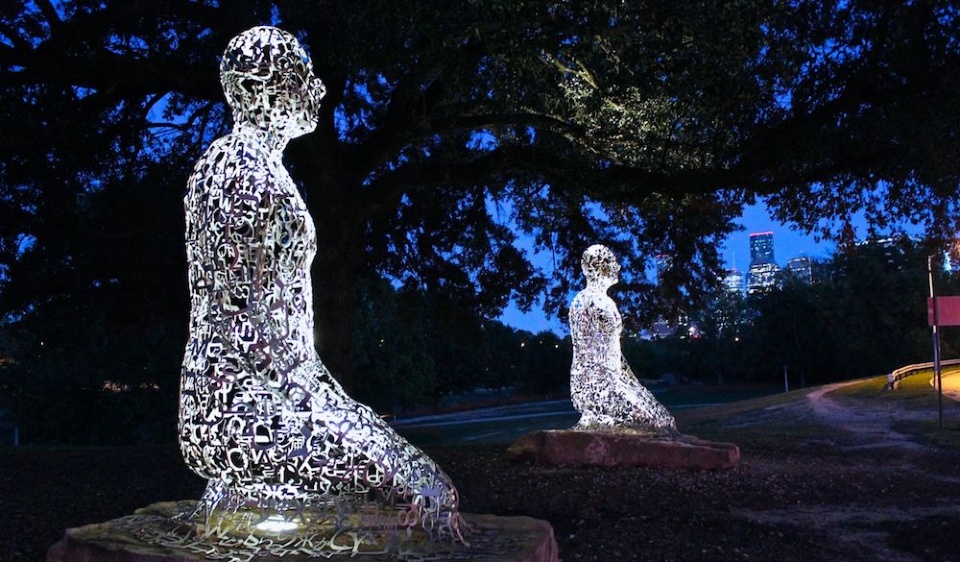The fast pace of life in the 21st century
can often lead one to need a moment to catch one’s breath. We see strong evidence of this
fast-paced life in our schools with the frenetic use of texts, e-mails, cell
phones, and Google searches by students who “sneak in” a message or two between
(or during) classes. EVERYTHING is
urgent and intense nowadays, hence a need for offering ways to find grounding
and balance.
Spiritual
Guidance and Community Involvement Animators (often called “Spiritual and
Community Animators” or “Spiritual Animators” for short) are trained
professionals who serve the needs of students at the spiritual, ethical and
value-based level. As the ministère de l’Éducation
puts it, the goal of the service is “To
help students reflect on the meaning of life and their own lives; to better
understand world values and their own personal convictions; to develop their
social conscience through openness to others and to the world; and to humanize
their environment through cooperation, service and solidarity.” (ministère
de l’Éducation, du Loisir et du Sport)
As diverse as is the family of schools in a
given school board, the work of the Spiritual Animator can cover the scope of
religions, cultures, philosophies and ethical concerns that our diverse school
populations bring to the education experience. This is one of the richest parts of our work in support of
the students and adult staff we serve.
When Quebec changed its education system through
Bill 118, it created one public system that, unlike many other public systems,
was not only “tolerant” of spiritual practices, but encourages a broad
education about world religions, cultures and ethics. This is the same reform that saw the creation of the
Spiritual Animator positions, and the Ethics, Religions & Cultures course
and educator roles to teach the material.
So we work in partnership with ERC educators, school professionals and educators across the pedagogical spectrum when courses
touch on religious, cultural or ethical implications of what is being
studied. A look at the ethical,
cultural and religious tensions around the start of World War I might serve as
one example of cross-discipline learning that Spiritual Animators can help
facilitate. Usually in partnership
with the ERC classes, we help schools coordinate visits to the religious
practice sites of many of the major world religions to allow students to learn
about their Muslim, Hindi, Jewish, Buddhist, Sikh, Christian, Unitarian,
Humanist and other neighbours’ faith experience, whose spiritual practice may
be different from their own. While
we do not promote any one religion, we certainly work diligently and carefully
to help students understand more about the diversity of spiritual practice in
the world around them, as well as to tap into their own guiding practice or
spiritual background.
Also as part of our work, we provide in-class
programming on a wide range of cultural, ethical, spiritual and communal issues
including some of the religious observances of different faiths, celebrations
of common days like Thanksgiving, Earth Day and U.N. Day; universal themes like
Light, Hope, Peace, Compassion; and communal themes like Black History month,
First Nations Day, and Yom HaShoah.
We also offer a variety of programs aimed at helping students be better
local and global citizens through offerings in areas of Character Development,
Random Acts of Kindness, Anti-bullying, Moral Intelligence, Leadership and
Transitioning to Secondary School.
Spiritual Animators are often called upon to
help with the many school assemblies that are part of a school’s calendar. Based on themes ranging from “Citizen of
the Month” to “Bee-Attitudes” to “Peaceful Schools”, Spiritual Animators help
students celebrate achievements, recognize their own leadership, and empower
them to reach their full potential as important members of the school
community. In times of transition
or loss, Spiritual Animators serve as support for students and staff through
one-on-one listening and school ceremonies to help people move through the
transition or loss they are experiencing.
We are also called upon to animate occasional special events in the
lives of the school communities we serve, like school anniversaries, school
recognitions, and milestones.
In an era of instant messaging and immediate
gratification, one of the hallmarks of Spiritual Animators lies in our encouraging
students to “go deeper” into the currents of the “Why?” questions of our day. We provide programming that invites
everyone to look beyond their own experience to connect with that of others and
to find the humanity in all and the values we share in common. Sometimes this means challenging
attitudes and preconceptions, or “going against the current”, if you will. But this, too, is a rich part of the
work we do, as it always offers opportunities for learning through dialogue.
I
feel it is both an honour and a privilege to serve schools as a Spiritual
Animator. On a daily basis, we get
to witness countless “Aha!” moments when those we serve come to see a reality
in a new and empowering way, or when they actually sense a connection with
people a world away living a particular challenge or situation, or when they
have a deepened understanding of their role in the global community. We are blessed to play a role in the
weaving of community in the schools we serve, and to accompany people in major
moments in the school year, sometimes with tears, and most often, in joy. I feel this work is part of a holistic
approach to education to help those we serve become good at compassion as they
are good at Science, French, Math, Music or Geography. How fortunate we are to walk on such
holy ground!

 In The Latest Issue:Latest Issue:
In The Latest Issue:Latest Issue:
- A Bittersweet Farewell
- The new Laval Aquatic Co...
- The End of an Era:
Articles
Calendar
Virtual- ANNUAL TEACHER APPRECIATION CONTEST
- APPUI LAVAL
- ARTS & CULTURE
- CAMPS
- CAR GUIDE
- CCIL
- CENTENNIAL ACADEMY
- CHARITY FUNDRAISING
- CITYTV
- COSMODÔME
- COMMUNITY CONNECTIONS
- COVER STORY
- DINA DIMITRATOS
- ÉCOLE SUPÉRIEURE DE BALLET DU QUÉBEC
- EDITORIALS
- ÉDUCALOI
- EDUCATION
- EMPLOYMENT & ENTREPRENEURSHIP
- FÊTE DE LA FAMILLE
- FÊTE DU QUARTIER SAINT-BRUNO
- FAMILIES
- FESTIVAL LAVAL LAUGHS
- FÊTE DE QUARTIER VAL-DES-BRISES
- FINANCES
- GLI CUMBARE
- GROUPE RENO-EXPERT
- HEALTH & WELL-BEING
- 30 MINUTE HIT
- ANXIETY
- CHILDREN`S HEALTH & WELLNESS
- CLOSE AID
- DENTAL WELLNESS
- EXTREME EVOLUTION SPORTS CENTRE
- FONDATION CITÉ DE LA SANTÉ
- GENERAL
- HEARING HEALTH
- MESSAGES FROM THE HEALTH AGENCY OF CANADA
- MENTAL HEALTH
- SEXUALITY
- SOCIAL INTEGRATION
- SPECIAL NEEDS
- TEENS
- THE NUTRITION CORNER
- THE NUTRITION CORNER - RECIPES
- VACATION DESTINATION
- WOMEN'S FITNESS
- WOMEN'S HEALTH
- HILTON MONTREAL/LAVAL
- HOME & GARDEN
- INTERNATIONAL WOMEN'S DAY
- JAGUAR LAVAL
- LAVAL À VÉLO
- LAVAL FAMILIES TV SHOW
- LAVAL FAMILIES MAGAZINE CARES
- LAVAL URBAN IN NATURE
- LE PARCOURS DES HÉROS
- LES PETITS GOURMETS DANS MA COUR
- LEON'S FURNITURE
- LEONARDO DA VINCI CENTRE
- LFM PREMIERES
- LIFE BALANCE
- M.P. PROFILE
- MISS EDGAR'S AND MISS CRAMP'S SCHOOL
- MISSING CHILDREN'S NETWORK
- NETFOLIE
- NORTH STAR ACADEMY LAVAL
- OUTFRONT MEDIA
- PASSION SOCCER
- PARC DE LA RIVIÈRE-DES-MILLE-ÎLES
- PÂTISSERIE ST-MARTIN
- PIZZERIA LÌOLÀ
- PLACE BELL
- PORTRAITS OF YOUR MNA'S
- ROCKET DE LAVAL
- SACRED HEART SCHOOL
- SCOTIA BANK
- SHERATON LAVAL HOTEL
- SOCIÉTÉ ALZHEIMER LAVAL
- STATION 55
- STL
- SUBARU DE LAVAL
- TECHNOLOGY
- TEDXLAVAL
- TODAY`S LAURENTIANS AND LANAUDIÈRE
- TODAY`S LAVAL
- WARNER MUSIC
- THIS ISSUE
- MOST RECENT
Magazine
Negotiating the Waters of Spirituality in 21st Century Schools
Articles ~e 105,7 Rythme FM 4 chemins Annual Teacher Appreciation Contest Appui Laval Arts & Culture Ballet Eddy Toussaint Camps THIS ISSUE MORE...
CONTESTS Enter our contests
CONTESTS Enter our contests
CALENDAR
Events & Activities
COMMUNITY Posts Events
PUBLICATIONS Our Magazine Family Resource Directory
LFM BUSINESS NETWORK Learn more
COUPONS Click to save!
COMMUNITY Posts Events
PUBLICATIONS Our Magazine Family Resource Directory
LFM BUSINESS NETWORK Learn more
COUPONS Click to save!
SUBSCRIPTIONS
Subscribe to the magazine
Un-Subscribe
E-NEWSLETTER Subscribe to our E-newsletter Un-Subscribe
WRITE FOR US Guidelines & Submissions
POLLS Vote today!
E-NEWSLETTER Subscribe to our E-newsletter Un-Subscribe
WRITE FOR US Guidelines & Submissions
POLLS Vote today!
ADVERTISERS
How to & Media guide
Pay your LFM invoice
SUGGESTIONS Reader's Survey Suggest a Listing
LFM About Us Our Mission Giving Back Contact Us
SUGGESTIONS Reader's Survey Suggest a Listing
LFM About Us Our Mission Giving Back Contact Us
 PICK-UP LOCATIONS
Get a copy of LFM!
PICK-UP LOCATIONS
Get a copy of LFM!
TERMS & CONDITIONS Privacy | Terms
ISSN (ONLINE) 2291-1677
ISSN (PRINT) 2291-1677
Website by ZENxDESIGN




 BY:
BY: 
Tweet
Share